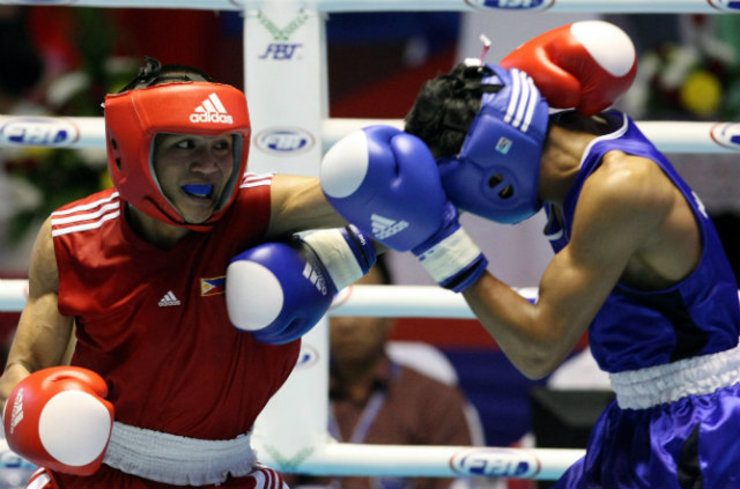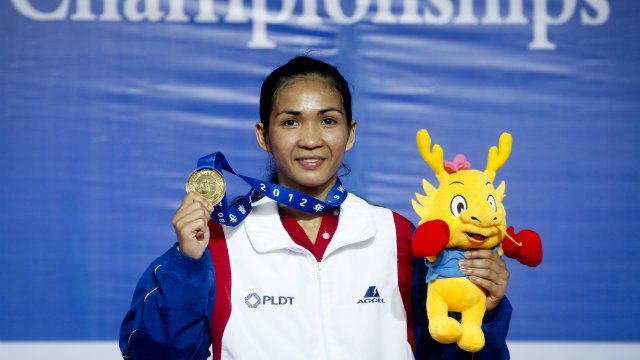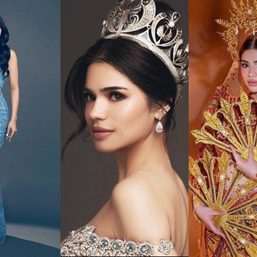SUMMARY
This is AI generated summarization, which may have errors. For context, always refer to the full article.

MANILA, Philippines – On the second floor of a small, two-storey building near the back of the Rizal Memorial Sports Complex, a dozen or so young boxers fill the air with a cacophony of punches. The thwack of blows against leather punching bags and punch mitts drowns out the chaotic sounds of Manila rush hour traffic outside, replacing it with something more aspirational and hopeful.
There is none of the glamor or fanfare accompanying the Gilas Pilipinas basketball team to the Incheon Asian Games, where the Association of Boxing Alliances in the Philippines (ABAP) team will aim to improve on their 3-medal performance in Guangzhou.
The athletes are diminutive; there is a hungry look in their eyes. They fight not only for country, but for hopes of a life better than the ones they were born into.
“The lowest,” said ABAP Executive Director Ed Picson, when asked which socioeconomic levels the boxers come from. Virtually all of the boxers on the team come from provincial areas, and Picson estimates 75-80% are current members of the Philippine military on detailed service.
Some, like injured 2011 World Junior flyweight champion Eumir Felix Marcial of Zamboanga, grew up in homes with dirt floors and no bathrooms. For capturing the country’s first gold at the AIBA World Junior Championship in Kazakhstan, the Philippine Air Force enlistee received P300,000 from chief sponsor Smart-PLDT, plus a motorcycle.
At the Asian Games, PLDT, which is headed by Philippine sports ninong Manny V. Pangilinan, a gold medal will earn P3 million ($67,468 USD), a silver P1 million while a bronze will fetch P750,000.
“You gotta fight in Vegas,” said Picson, when asked what a Filipino pro boxer would have to do to fetch a similar purse.
When the boxing competitions kick off on Wednesday, September 24, the Philippines will hinge its medal aspirations on 8 boxers: light flyweight Mark Anthony Barriga, flyweight Ian Clark Bautista, bantamweight Mario Fernandez, lightweight Charly Suarez, light welterweight Dennis Galvan, middleweight Wilfredo Lopez, plus female flyweight Josie Gabuco and lightweight Nesthy Petecio.
Aside from Marcial, another notable absence is the country’s lone gold medalist at the 2010 Games, Rey Saludar, who suffered a rotator cuff injury earlier this year after winning gold at the National Games.
In his place is 19-year-old Bautista from the Philippine epicenter of amateur boxing, Negros Occidental. Bautista won gold at the 2014 China Open International Boxing Tournament and the 2013 Asian Confederation Youth Boxing Championships.
“Rey Saludar is a seasoned veteran and we will miss him but I don’t think we’ve lost much with Ian Bautista in the lineup,” said Picson, a broadcast veteran who took over the team several years back. “He’s young, he’s vibrant and raring to go.”
For experience, the team will rely on veterans like the 26-year-old Suarez, who competed for India and Italy in the semi-pro World Series of Boxing, and his fellow Davao del Norte native Barriga, the country’s lone boxing representative at the 2012 Summer Olympics.
Gabuco, a single mother from Laguna, won gold at the 2012 AIBA Women’s World Championship and earned P1 million in the process. As the current world’s top-rated female in her weight, the 3-time SEA Games gold medalist Gabuco has to be considered a gold favorite in Incheon.

“It’s a merry mix of veterans and younger boxers,” said Picson, whose team just wrapped up training at the Australian Institute of Sport in Canberra, Australia. “It’s a dynamic team; we feel that everyone has a chance.
“When people ask me for predictions I’ve got a standard reply: we don’t even know who we’re up against. Obviously in the amateurs, you’re at the mercy of the luck of the draw. If you get a good draw, you have better chances. What we do is prepare for any eventuality and that’s as far as we can go.”
This will be the first Asiad since AIBA shook up the rules a year ago. Boxers won’t wear headgear, giving the matches the look of a professional contest. Scores will no longer be announced after each round, discouraging boxers from coasting on an early lead.
Despite the success of Manny Pacquiao in the professional ranks, boxing remains a sport of necessity for Filipino youth. Basketball, which has assumed recognition as the nation’s favored sport, offers better scholastic and financial opportunities than boxing. There is also lesser risk of concussion and broken noses associated with hoops.
To help improve visibility of the sport, Picson says his organization has worked to host local tournaments in open air venues instead of auditoriums, where local residents are more likely to stop and take in the sights.
“The Filipino sports fan has been so used to basketball because almost everyone can play basketball. Not everyone can do boxing,” said Picson, who had commentated Philippine Basketball Association games for decades.
“We try to hold [tournaments] in open air because that attracts a lot of people. They won’t go into an air-conditioned gymnasium for free. That’s how the Filipinos are. I think it’s going to take some time before we can change that outlook.”
Though the financial incentives remain relatively significant, they pale in comparison to what boxers from more economically prosperous countries can expect with a top finish. What they do have is an experienced team of trainers who are former members of the national team and, Picson hopes, enough desire to fight harder than their opponents to compensate for smaller budgets.
“It’s not easy because these boxers see what [boxers from other countries] got, see how they’re treated. You win a gold medal and get a beamer. Most of our boxers, they get a motorcycle and that’s a big thing for them.
“In that respect we cannot expect to be at par with them so far as resources are concerned. But – and everyone acknowledges this – Filipinos boxers have that innate talent for the sport and it’s just up to us to work with what we have and try to approximate what they’re doing in other places.” – Rappler.com
Add a comment
How does this make you feel?





There are no comments yet. Add your comment to start the conversation.